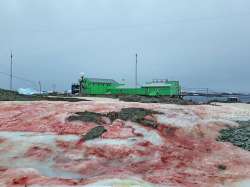Antarctica snow turns blood red in viral pictures
An astounding set of images that shows Antarctica snow turning blood red is going viral. The said pictures are taken near a former British research station.

An astounding set of images that shows Antarctica snow turning blood red is going viral. The said pictures are taken near a former British research station. The ice has apparently turned red due to microscopic algae that can survive in freezing temperatures. A Twitter user shared the images with the caption, "Shocking Images of Antarctica's Blood Red ice are an ominous sign of Climate change as water around the icy continent is increasingly heating up Mike Hudema."
The images were also released by Ukraine's Ministry of Education and Science on Facebook. The phenomenon is caused by microscopic snow algae when weather conditions are favourable during Antarctica's summer months.
"Snow blossoms contribute to climate change. Because of the red-raspberry colour, the snow reflects less sunlight and melts faster. As a result, it produces more bright algae," a Facebook post by the ministry added.
The ministry also said that chlamydomonas nivalis algae's cells have a red carotene layer which protects it from ultraviolet radiation and produces red spots in the snow. "Because of the red-crimson colour, the snow reflects less sunlight and melts faster," the ministry said.
As the post went viral, Twitterverse was flooded with reactions.
A user wrote, "It looks like a margarita pizza with basil."
Another wrote, "That 'blood' or 'jam' is actually a type of red-pigmented algae. The algae thrive in freezing water and spend winters lying dormant in snow and ice; when summer comes and the snow melts, the algae bloom, spreading red, flower-like spores."
A post read, "Snow has taken on a sinister-looking blood red colour at a Ukrainian research station due to a type of algae which contributes to climate change."
"There is a glacier called 'Blood Falls' in Antarctica that regularly pours out red liquid, making it look like the ice is bleeding. (It's actually oxidised salty water.) cool right?" a user remarked.
(with inputs from IANS)